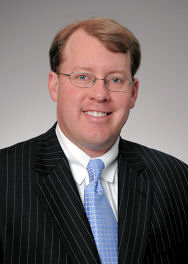Nathan (Nat) Hardwick, the former chief executive officer of LandCastle Title and former managing partner of Morris Hardwick Schneider, was found guilty late last week of embezzling more than $25 million from his former companies, bringing an end to a massive scandal that destroyed a prominent real estate firm and left hundreds of people without jobs.
On Friday, a federal jury convicted Hardwick on 21 counts of wire fraud, one count of conspiracy to commit wire fraud, and one count of making false statements to a federally insured financial institution, relating to allegations that he conspired with Asha Maurya, the law firm’s former chief financial officer, to steal $26 million from the attorney escrow accounts and operating accounts of Morris Hardwick Schneider and LandCastle Title.
“Hardwick was motivated by unadulterated deceit and greed when he blatantly violated the trust placed in him by embezzling millions of dollars from his clients and partners,” said U.S. Attorney Byung Pak. “The extravagant lifestyle that Hardwick enjoyed at the expense of others will now be traded for time in prison.”
The Hardwick scandal first began back in 2014, when Hardwick’s former partners with the law firm sued him for allegedly embezzling $30 million from the firm’s accounts and the accounts of the firm’s subsidiary, LandCastle Title.
The allegations against Hardwick first came to light when Fidelity National Financial bailed out LandCastle and stepped in as a 70% owner of the title company. Fidelity eventually acquired the rest of the company, but the law firm wasn’t so lucky.
Fidelity took over initially after “substantial escrow account misappropriations” were discovered with the accounts of MHS and LandCastle and “precipitated by a significant shortage in the accounts of MHS and LandCastle, of which Fidelity became informed by the partners of MHS.”
Hardwick’s former partners, Mark and Rod Wittstadt, sued Hardwick, alleging that Hardwick embezzled at least $30 million from the companies’ accounts and the companies’ trust accounts, allegedly using the money to fund a lavish lifestyle, cover real estate investment losses, cover millions in gambling debts and other investments.
Hardwick denied those charges, stating at the time that he is not guilty of “any improper, illegal or unethical conduct,” and stating that he believes all of the money he received was “properly distributed to him as his share of the profits of the firm.”
From there, the situation only got uglier and nastier, eventually ensnaring one of the country’s top golfers.
Soon after the Wittstadts sued Hardwick, PGA golfer Dustin Johnson sued the firm for allegedly stealing millions of dollars from him.
Johnson’s lawsuit, which was first reported by HousingWire, accused Morris Hardwick Schneider, which subsequently changed its name to Morris Schneider Wittstadt, Hardwick, and the Wittstadts, of using their positions as Johnson’s “trusted advisors” to steal $3 million from him.
Hardwick was, at one time, one of Johnson’s closest advisors. In Johnson’s suit, he claimed that Hardwick “played a particularly unique and significant role of trust and confidence” in Johnson’s life, serving as one of his primary advisors on his career as a professional golfer.
Hardwick was also an officer in Johnson’s professional corporation, and was listed on Johnson’s personal website as a member of “Dustin’s Team” as Johnson’s “attorney/counselor.” Hardwick was also friends with several other PGA players and eventually got into NASCAR team ownership, all part of his “extravagant lifestyle” that was apparently funded with ill-gotten gains.
While the firm was suffering, Hardwick allegedly came to Johnson to ask him to lend money to the firm, and was told he’d get $4 million back in exchange for his loan of $3 million, but did not tell Johnson about what was going on at the firm.
Therefore, Johnson didn’t know that the money was used to cover shortages in the firm’s accounts allegedly created by Hardwick himself.
Johnson’s original lawsuit laid much of the blame on Hardwick, but later filings in the lawsuit shifted the blame from Hardwick toward the Wittstadts instead.
Eventually, Morris Schneider Wittstadt filed for Chapter 11 bankruptcy and shut down, citing the publicity surrounding the Hardwick situation and subsequent lawsuits as “too much for even an otherwise successful firm like MSW to bear.”
It was a swift and spectacular fall for a firm that once employed approximately 800 people in 16 states and specialized in residential real estate closings and foreclosures. Hardwick was the managing partner of the law firm, the CEO of its title business, and ran the law firm’s closing division.
According to the charges against Hardwick and Maurya, the pair worked together to conceal the funneling of millions of dollars from the firm’s and title company’s accounts to Hardwick and Maurya. Hardwick claimed that all the money he received was deserved and on the up and up, but the authorities (and his former partners) claimed otherwise.
The U.S. Attorney’s Office claimed that Hardwick allegedly began experiencing “severe” financial problems in the late 2000s, when a “sharp decline” in the residential real estate market made MHS less profitable.
Hardwick was also subject to a July 2008 divorce decree requiring him to pay his ex-wife over $550,000 per year in alimony and other payments for five years.
According to the release, Hardwick’s “legitimate” income could not “keep pace with his lavish lifestyle,” which included private jet travel; multi-million dollar homes; high-end retail goods and services; gambling at casinos in Louisiana, Mississippi, New Jersey, and Nevada; and payments to “bookies and girlfriends.”
To support his lifestyle, Hardwick allegedly began directing Maurya to make millions of dollars in shareholder distributions, bonuses, and other payments for his benefit, directly out of MHS’s bank accounts, in amounts that were more than the share of MHS’s profits that Hardwick was entitled to.
Evidence presented during his trial showed that Hardwick was paid out more than $26 million from MHS’s accounts and used the money to cover his personal debts and expenses and to finance his “extravagant lifestyle.”
According to the U.S. Attorney’s Office, more than $19 million of that was client money that was stolen from MHS’s attorney trust accounts. Hardwick spent approximately $18.5 million of the fraud proceeds on gambling, private jets, and “more than 50 different social companions,” the U.S. Attorney’s Office said.
And while Hardwick was receiving that money, he and Maurya “conspired to cover-up the fraud and made numerous false statements to Hardwick’s law partners concerning the amount of money that Hardwick was taking out of the firm,” the U.S. Attorney’s Office said.
Hardwick and Maurya were originally indicted in February 2016. The original indictment charged Hardwick and Maurya with conspiracy, wire fraud, and bank fraud. It also charged Hardwick with making false statements to a federally insured financial institution and charged Maurya with mail fraud.
Maurya pleaded guilty to conspiracy in May 2017, and agreed to help prosecutors make their case against Hardwick.
And after a nearly month-long trial, Hardwick was found guilty on 23 charges.
Both Hardwick and Maurya are set to be sentenced at an unspecified later date.
“This case is especially troubling given the illegal actions were orchestrated by a lawyer who swore an oath to uphold the law and represent his clients with integrity,” said Chris Hacker, Special Agent in Charge of FBI Atlanta. “The magnitude of theft Hardwick is convicted of merits a lengthy sentence, one that will hopefully send a message that the FBI and U.S. Attorney’s Office will not tolerate this type of white-collar crime.”
For a look at HousingWire's extensive coverage of the Hardwick situation since the very beginning, click here.







